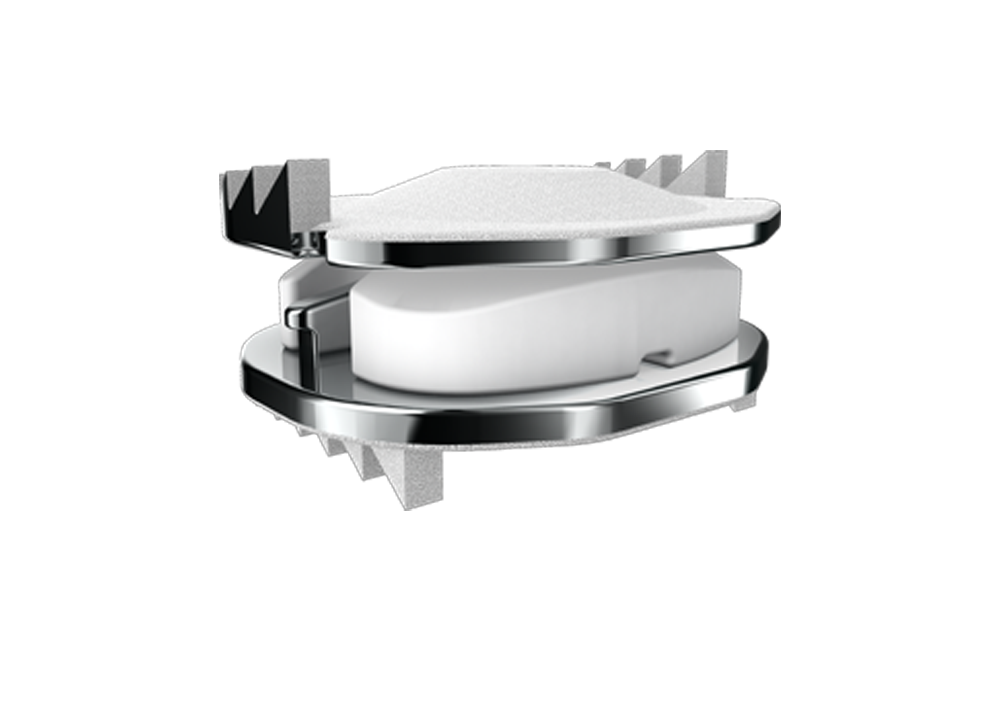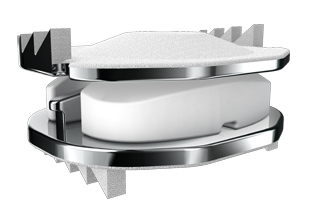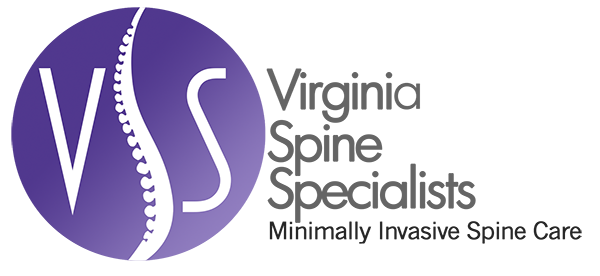Advanced, motion-preserving solutions for neck and arm pain

Cervical disc surgery is performed to relieve nerve or spinal cord compression in the neck that causes persistent pain, numbness, weakness, or loss of function.
At Virginia Spine Specialists, Dr. Mudit Sharma utilizes the Mobi-C® Cervical Disc, an FDA-approved artificial disc. The Mobi-C Cervical Disc is one of the most widely used cervical discs in the world.
Understanding a Cervical Disc Problems
What Is Cervical Disc Disease?
The cervical spine (neck) contains discs that act as cushions between the vertebrae. Over time, or due to injury, these discs can degenerate or herniate, placing pressure on nearby nerves or the spinal cord.
Common cervical disc conditions include:
- Herniated cervical discs
- Degenerative disc disease
- Disc-related spinal stenosis
When nerve compression occurs, symptoms can extend beyond the neck into the shoulders, arms, and hands.
Symptoms
Cervical disc surgery may be considered when patients experience:
- Persistent neck pain
- Arm pain radiating from the neck
- Numbness or tingling in the arms or hands
- Weakness in the arms or grip
- Symptoms that do not improve with physical therapy, medications, or injections
Progressive neurological symptoms warrant timely evaluation.
Treatment Options
Conservative (Non-Surgical) Treatment
Most patients improve without surgery. Initial treatment often includes:
- Physical therapy
- Anti-inflammatory medications
- Image-guided cervical injections
- Activity modification and posture correction
Surgery is considered only when symptoms persist or worsen despite appropriate care.
Modern Cervical Disc Surgery
Cervical Disc Replacement (Artificial Disc)
For carefully selected patients, cervical disc replacement offers an alternative to traditional fusion by preserving motion at the affected level.
At Virginia Spine Specialists, Dr. Mudit Sharma utilizes the Mobi-C® Cervical Disc, an FDA-approved artificial disc designed to:
- Maintain natural neck motion
- Reduce stress on adjacent spinal levels
- Eliminate the need for bulky plates or extensive hardware
Mobi-C® is one of the few cervical discs approved for both single-level and two-level disc replacement, making it a versatile option for eligible patients.
Cervical Fusion (When Necessary)
In cases where disc replacement is not appropriate—such as significant instability, arthritis, or deformity—minimally invasive cervical fusion may be recommended to relieve nerve compression and stabilize the spine.
The choice between disc replacement and fusion is made carefully, based on anatomy, imaging findings, and long-term goals.
Mobi-C® Cervical Disc

Mobi-C History
The Mobi-C Cervical Disc is one of the most widely used cervical discs in the world. First implanted in France in November 2004, Mobi-C has been implanted in more than 40,000 spinal levels in 25 countries.
A total of 599 patients were involved in the Mobi-C U.S. clinical trial, which represents the largest concurrent clinical trial ever conducted for cervical disc replacement. Mobi-C received FDA approval in August of 2013, making it the first cervical disc with both one and two-level indications.
Mobi-C – How it Works
Mobi-C contains patented mobile bearing technology that allows the polyethylene core to slide and rotate inside the disc for self-adjustment to the cervical spine movements. This means that Mobi-C can react to the normal motion in the cervical spine.
Mobi-C provides bone sparing fixation without chisel cuts into the small vertebral bodies of the cervical spine, making it bone sparing.
Mobi-C – Clinical Trial Results at 5-Years
In the one-level study, Mobi-C demonstrated non-inferiority to anterior cervical discectomy and fusion (ACDF) as reflected in the primary composite endpoint. In the two-level study Mobi-C demonstrated SUPERIORITY to ACDF in the primary composite endpoint. Key results from the two-level study include:
- Overall trial success was 62.8% for Mobi-C and 34.1% for fusion, which represents statistical superiority (p< 0.0001).
- The rate of subsequent surgeries at the operated level for Mobi-C was 3.8% versus 16.2% for fusion.
- The percentage of subjects who demonstrated adjacent segment degeneration (determined by x-ray) was:
- 77.5% of Mobi-C patients compared to 44.9% of ACDF patients at the inferior adjacent level
- 67.4% of Mobi-C patients compared to 29.2% of ACDF patients at the superior adjacent level
- Mean return to work time was 20.9 days shorter for Mobi-C patients compared to fusion patients.
As with any surgery, complications may occur as a result of treatment. Potential complications following treatment with the Mobi-C include:
- Pain in the neck, arm, back, shoulder, or head.
- The feeling of pins and needles in the arms.
- Difficulty swallowing.
Additional information regarding the Mobi-C Cervical Disc can be found at www.ldr.com and www.cervicaldisc.com
Images copyright: www.cervicaldisc.com
Why Motion Preservation Matters
Preserving motion in the cervical spine may:
- Improve long-term neck mobility
- Reduce strain on adjacent discs
- Support faster functional recovery
Not every patient is a candidate for disc replacement, which is why expert evaluation is essential.
Advanced Cervical Spine Care with Dr. Mudit Sharma
As a board-certified neurosurgeon, Dr. Sharma specializes in advanced cervical spine surgery, including motion-preserving cervical disc replacement using the Mobi-C® Cervical Disc, as well as minimally invasive fusion techniques when needed.
Call (571) 921-4877 for an appointment.
Serving Manassas, Fredericksburg, Dulles and surrounding Northern Virginia communities
Frequently Asked Questions
The Mobi-C® Cervical Disc is an FDA-approved artificial disc designed to replace a damaged cervical disc while preserving natural motion.
Disc replacement preserves motion and may reduce stress on adjacent levels, but it is not suitable for every patient. An evaluation is required to determine the best option.
Yes. By relieving nerve compression, disc replacement can significantly reduce arm pain, numbness, and weakness caused by cervical disc disease.
Many patients return to light activity within weeks. Recovery time varies depending on the procedure and individual healing.

Toll Free: (855) 774-6334
Fax: (571) 208-0585
Conditions We Treat
Chronic Back Pain
Neck Pain
Arm Pain and/or Numbness
Leg Pain and/or Numbness
Herniated Disc – Lumbar and Cervical
Sacroiliac Joint (SI) Pain
Slipped Disc
Spinal Stenosis
Spinal Fractures
Whiplash Syndrome
Failed Back Surgery
Office Hours & Locations
Monday – Thursday: 8am – 4pm Friday: 8am – 2pm Loudoun County 24430 Stone Springs Blvd, Suite 250 Dulles, VA 20166 Spotsylvania County 4604 Spotsylvania Parkway, Suite 300 Fredericksburg, VA 22408 Prince William County 9625 Surveyor Ct. Suite 320 Manassas, VA 20110
